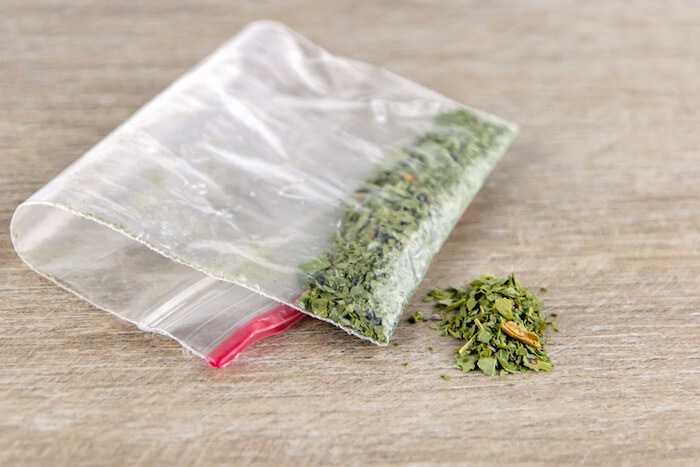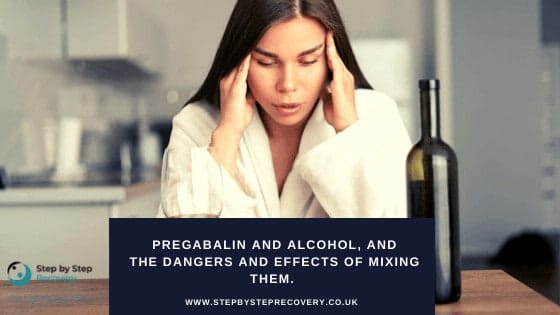Synthetic cannabinoids, generally called synthetic cannabis, are best known by the name Spice. They are designer drugs created in a laboratory to mimic the effects of cannabis, although they are generally designed to create stronger effects than “natural” cannabis. Similar to opioids, synthetic cannabinoids function by engaging with certain receptors found in various regions of the central nervous system (CNS).
Although synthetic cannabis often resembles dried cannabis leaves and buds, the actual active chemicals are simply powders that are typically combined with solvents. This is sprayed onto various plant substances to make it look like a “natural” substance. The dried plant cuttings may have their own qualities, which could cause an unintentional side effect or have been coated in something hazardous, like an insecticide. Another risk is the smoking mixture might still contain solvent residue from the mixing or spraying process, like acetone and methanol.
Due to the lack of regulation, there is no consistency in the strength of synthetic cannabinoids. You can never be certain of the substance you’re purchasing or how it might impact you because both the mixes of plant cutting and the chemical composition of the synthetic cannabinoids fluctuate constantly.
Generally sold in small packets with specific brand names, even when sold under the same brand name, each batch will likely differ in strength and the effects it produces. Known by many names, here are some of the most common names for synthetic cannabinoids:
- Spice
- Northern Lights
- Kronic
- K2
- Amsterdam Gold
- Kaos
- Black Mamba
- Blue Cheese
- Mary Joy
- Tai High Hawaiian Haze.
How Are Synthetic Cannabinoids Consumed?
Synthetic cannabinoids are most often smoked in a roll-up with tobacco, referred to as a spliff or joint. This makes it difficult to know if you are smoking “natural” cannabis or synthetic cannabinoids unless you make your own roll-ups.
Sometimes, synthetic cannabis is smoked using a pipe or bong in the same way cannabis is smoked. As it often closely resembles the cannabis leaves and buds, it’s easy to mistake synthetic cannabis for natural cannabis — even if it’s in a pipe or bong without tobacco.
Additionally, synthetic cannabis edibles are also produced in the form of sweets or lollipops. The plant mixtures that contain synthetic cannabinoids can also be cooked in cakes, cookies, and other foods. More recently, e-cigarette liquids have been sold that contain synthetic cannabinoids for vaping.
Step by Step Recovery offers quick admittance into our residential rehab facility in Essex, along with confidential advice on addiction treatment. For guidance without any obligation, simply fill out our online contact form or give our understanding team a call at 0800 170 1222.
Can You Be Addicted to Synthetic Cannabinoids?
Addiction to synthetic cannabinoids is associated with withdrawal symptoms that often occur within two to four days of stopping usage. Research of synthetic cannabinoids and physical withdrawal and dependence syndrome in patients after the use of the synthetic cannabinoid “Spice Gold” found evidence for cannabinoid withdrawal syndrome.
Withdrawal symptoms recorded in multiple case studies include:
- Intense cravings
- Excessive sweating
- Increased blood pressure
- Nightmares
- Tremors
- Headache
- Nausea and vomiting
- Depression and anxiety.
The duration of time you’ve used for and the quantity and frequency you use it are some elements that will determine whether or not you become dependent. When you have been using synthetic cannabinoids frequently, you may find it challenging to quit and potentially go through withdrawal symptoms in terms of mental and physical health.
What is the Best Addiction Treatment for Synthetic Cannabinoids?
Residential rehab for a minimum of 28 days is widely considered the best addiction treatment for psychoactive substances such as synthetic cannabinoids. You will normally be offered a medically supervised detox at the start of your stay. During a medical detox, you can be prescribed drugs to help ease the withdrawal symptoms associated with spice drug effects and other types of synthetic cannabinoids.
Detoxification typically takes between three and five days. Once you have completed your detoxification, the remainder of your residential rehab treatment will typically be a combination of therapy, group meetings and recreational activities, with set meal times organised over structured days.
NHS addiction treatment is provided in an outpatient setting. You can still access a medically supported detox, which you complete at home and various forms of therapy. If withdrawal symptoms are very severe, you might be admitted to the hospital to undergo a medical detox.
The NHS may fund private residential rehab. However, there are very strict criteria. Additionally, you are extremely unlikely to be approved for funding unless you have already undergone outpatient addiction treatment, which has not been successful.
Cannabinoids Effects
Spice effects and other types of synthetic cannabinoids are similar but typically stronger than natural cannabis. When smoked, the effects will normally be felt within around five minutes. When eaten, the effects may take longer to become noticeable.
Common cannabinoid effects include feeling:
- Happy and giggly
- Relaxed and, or drowsy
- Lack of coordination
- Talkative
- Hunger, often called getting the munchies
- Memory problems and amnesia
- Hot flushes
- Nausea and vomiting
- Paranoia and anxiety
- Panic attacks
Between 2012 and 2019, there have been 165 synthetic cannabinoid-related deaths recorded in the UK. Over 70% of deaths had acute synthetic cannabinoid receptor agonists (SCRA) usage as the primary cause of death, with respiratory problems being the most common underlying reason. Over 60% of SCRA users were discovered dead, and a significant percentage of those who were observed falling unresponsive were reported as collapsing abruptly.
Dangerous effects of synthetic cannabinoids can include:
- Fast and, or irregular heartbeat (arrhythmia)
- Cardiovascular problems
- Increased blood pressure (hypertension)
- Breathing difficulties (respiratory depression)
- High body temperature (hyperthermia)
- Breakdown of muscle tissue (rhabdomyolysis)
- Chronic kidney disease (CKD)
- Tremors
- Seizures and convulsions
- Stroke.
There is also concern that synthetic cannabis could result in serotonin syndrome, which can be fatal. Overdose, serotonin syndrome and death from synthetic cannabis are associated with the below symptoms:
- Fast and, or irregular heartbeat
- Chest pain
- Shallow or fast breathing
- Sweating and feeling hot
- Confusion and extreme agitation
- Seizures and convulsions
- Loss of consciousness.
Cannabinoids Effects With Other Drugs
When synthetic cannabinoids combine with other pharmaceuticals, such as prescription or over-the-counter (OTC) drugs, the resulting effects could prove life-threatening.
Although the effects are unpredictable, combining synthetic cannabis with antidepressants, particularly selective serotonin reuptake inhibitors (SSRIs), is especially dangerous. Taking synthetic cannabis with SSRIs could result in seizures, a high body temperature, rapid heartbeat, organ failure, coma, and could cause death.
Taking illicit stimulants like cocaine or crystal meth with synthetic cannabis can lead to cardiovascular problems. Deaths recorded by the National Programme on Substance Abuse Deaths (NPSAD) between 2012 and 2019 identified 90.3% of patients with multiple psychoactive drugs in their system, with alcohol the most often polydrug use, followed by opioids and benzodiazepines, cocaine, and cannabis.
For free, confidential guidance on treating and defeating addiction, contact our caring team at 0800 170 122 or send us an online inquiry using our contact form. At Step by Step Recovery, we offer specialised addiction treatment for polydrug use and the option to undergo a fully supervised medical detox at our residential rehab in Essex.
Mental Health Risks of Synthetic Cannabinoids
There are various serious mental health risks associated with synthetic cannabis, which can be more severe than with “natural” cannabis. Risk factors of experiencing a mental health condition when using synthetic cannabis increase when you are related to or have been diagnosed with or treated for psychological disorders.
However, synthetic cannabinoids have the potential to cause the following effects in people who do not have a family history of mental health disorders or previous mental health problems:
- Hallucinations
- Psychotic episodes that may continue for days or even weeks
- Anxiety and depression.
Frequent usage may also raise your chance of developing a mental health condition or trigger the recurrence of an existing one, particularly if there is a family history of these conditions.
Synthetic Cannabinoids and the UK Law
As with other designer drugs, synthetic cannabis was legal to sell when it was first produced. The passing of the UK Psychoactive Substances Act in 2016 made it illegal to produce, sell, or import (even if it’s for personal use) synthetic cannabinoids. However, they can still be sold for non-human consumption in the form of other substances, such as incense or potpourri.
Use our online contact form or give us a call at 0800 170 1222 for free advice and guidance. We at Step by Step Recovery can assist you in finding help and support, and our services are completely confidential.




